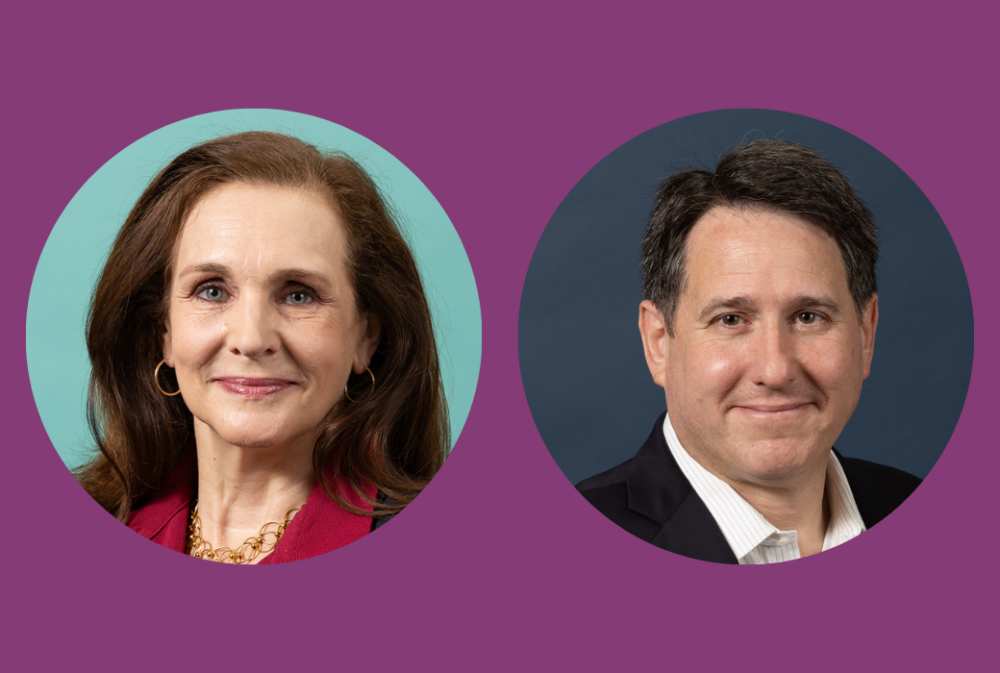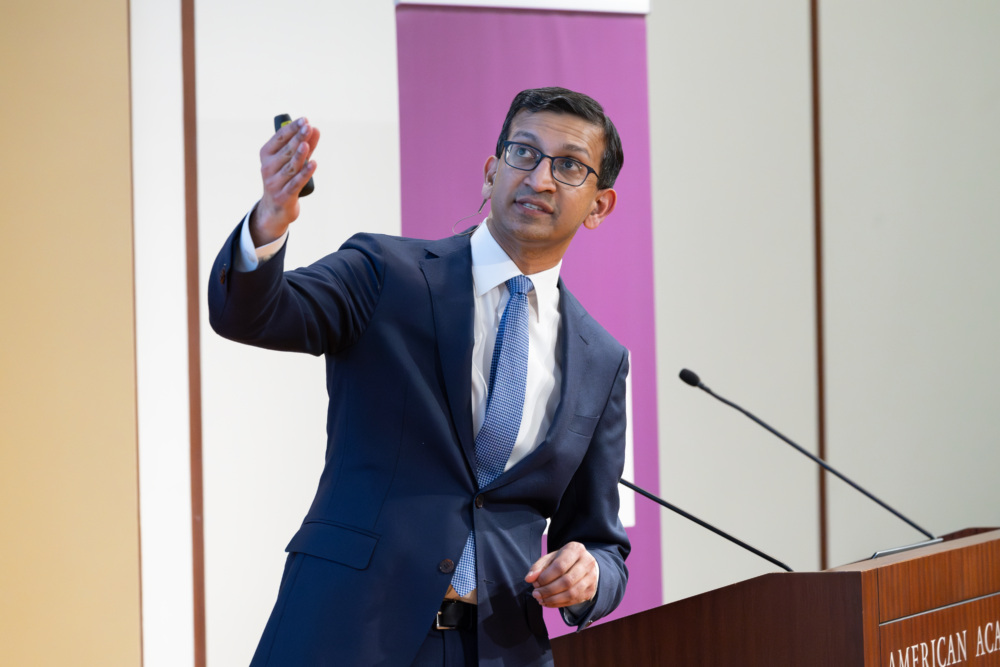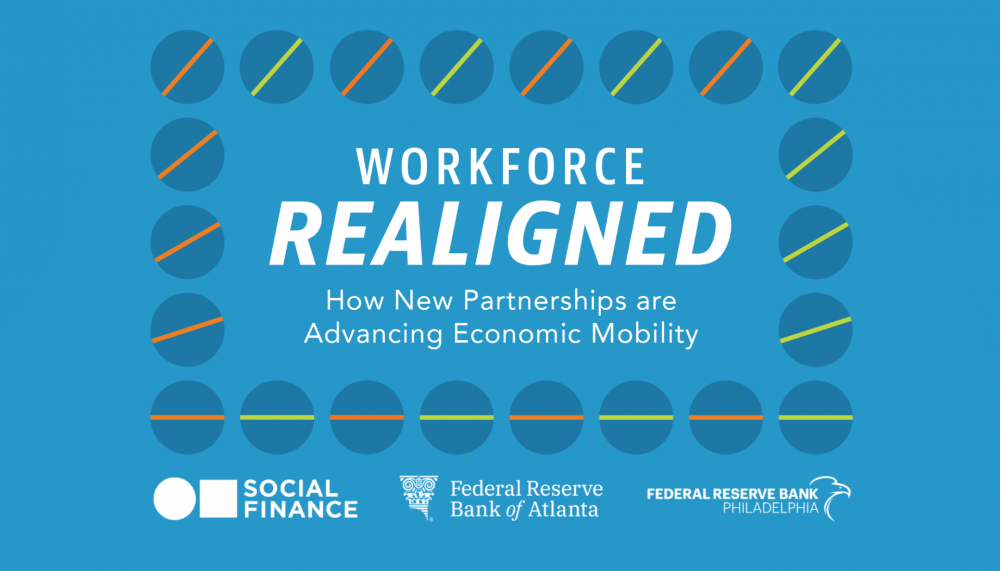

Multimedia
Social Finance Institute Managing Director Karen Anderson and Social Finance Institute Head of Policy David Socolow talk about the organization’s launch event, their respective paths to Social Finance, their vision for the Institute, and forthcoming work.
- Introductions: 0:00-2:54
- The Social Finance Institute launch: 2:55-4:51
- The Institute’s vision: 4:52-7:50
- Forthcoming work: 7:51-12:10
- Getting in touch: 12:11-13:02
Transcript
Karen Anderson: I’m Karen Anderson, the Managing Director of the Social Finance Institute. I joined the team last September to help launch and lead the Institute. I have worked in government, academia, at a think tank, and in the private sector. But my focus for the last 15, almost 20 years, has been on economic policy. I had the opportunity to help launch and lead the Hamilton project at Brookings, which is an economic policy initiative, and more recently to help build and expand the Becker Friedman Institute for Economics at the University of Chicago.
I also had the privilege of serving as the first Chief of Staff for President Obama’s Council of Economic Advisors, including the transition and getting that team in place, and was a senior adviser to Results for America during their early years.
It’s fair to say that I love to help launch and build new initiatives, which I think helped make the fit with the Social Finance Institute such a great one.
David Socolow: And I’m David Socolow. I’m the head of policy for the Social Finance Institute—just joined in spring of 2024 after a more than 30-year career working in federal and state government, in nonprofit advocacy, a policy organization, and in a private company, with the through line all of that time on both workforce training and higher education, post-secondary opportunity, and career pathways to help individuals advance their lives and economic prospects. So that’s been my focus across a variety of different roles, including leading a state labor department, leading a state higher education agency, working at the U.S. Department of Labor, and other exciting roles over the years.
I came to this work because one of the projects I did in my most recent stint running a state government agency in New Jersey was the first Pay it Forward program that Social Finance ever started with a state government, the first statewide Pay it Forward program. That was the New Jersey Pay it Forward Program, which we started off in 2021. And my agency was the lead agency for that and we got to know the Social Finance team and saw the power of this impact-investing approach to workforce training to stretch dollars further and train more people for good jobs.
So, I was enormously excited when they announced that they had hired Karen and started an Institute and were looking for someone to join the team to work on how to take these ideas to a policy community.
KA: We formally launched the Social Finance Institute on April 10th in Boston at the American Academy of Arts and Sciences, which was a fantastic venue. We had a very star-studded cast of speakers. We started on a very high note with two of our regional Federal Reserve Bank presidents, Tom Barkin of Richmond and Austin Goolsbee of Chicago, who were in conversation with former Massachusetts Governor Deval Patrick. They were great speakers, but this was really important: this was very meaningful for us as well because we are partnering with several of the regional Fed banks on a new Social Finance Institute project, so this was a great way to highlight that collaboration.
We ended the day with a very special speaker, Harvard Economist Raj Chetty, the Director of Opportunity Insights, who was joined in conversation by Ryan Ripple of the Gates Foundation. We were particularly honored to have Raj join us as the Social Finance Institute is launching a new research project with Opportunity Insights that we’re really excited about and that you might hear more about later in this discussion, from David. And then I would say, David, I would love to know your favorite part of the event.
DS: I think Karen described what was an incredible convening and all of the panels and speakers were amazing. But what I would say globally is we had so many different participants. We had more than 200 people from all different walks of life—all learning about different approaches to solving social problems and our opportunity with the Institute to bring the learnings from that practice and experience to a broader audience and to catalyze change at a bigger scale.
KA: As David said, we had a full house and the participants themselves were one of the key highlights of the event. I think that this audience knows that Social Finance is a very unique nonprofit working on outcomes-based funding and impact-first investing—all with the goal of improving economic mobility in the U.S. The Institute’s going to build on the learnings of Social Finance’s 13 years of practitioner experience in addition to the work and experience of others in the field, including scholars from academia and think tanks. We want to focus on what works, with the goal of providing tools for scaling successful programs. And we want to highlight what doesn’t work so that we don’t reinvent those experiences.
We’re going to have three general buckets of work with the Institute.
- Creating and disseminating applied research through collaborations between Social Finance experts and credible scholars and researchers and other practitioners in the field. Everything that we’re going to produce through the Institute is a public good and so we’re going to always be thinking about the broadest set of audiences for our products.
- We’re also going to create communities of practice to bring stakeholders together so that they can share best practices and learn from others in the field. We’re going to engage policymakers and other stakeholders through our work with advocacy and outreach. We want to build and expand the base of supporters for outcomes-based funding and impact-first investing as important models for consideration.
- It’s very deliberate that the Institute has launched out of the Washington, D.C. office of Social Finance. We think there’s an important role that we can play both in D.C. at the federal level and also at the state level. And so that third bucket of engaging policymakers, educational outreach is one that we’re taking very seriously and where we think we can have tremendous impact in the specific areas where Social Finance has a particular area of expertise and comparative advantage.
DS: And I think I’ll add to that just by saying from my life and career, and also from Karen’s, as an actual policymaker inside of government, I can attest to the fact that there’s a need for the Social Finance Institute. It is talking about a set of ways to solve problems—a set of creative ideas about which very little is known among many audiences: among advocacy groups and NGOs, among the media, among policymakers inside government and others in the field who are actually trying to solve problems aren’t aware of impact-first investing. They’re not aware of talent finance models to achieve a greater impact for workforce training to help people get better jobs.
There is so much we can do with the tools and the learnings from buckets one and two that Karen just said to do some education and outreach around these ideas and to drive policy change.
DS: Let me start with just a few of the of the initial projects we’re starting right off the bat.
- The first one is in the area of impact-first investing. We very much would like to do some applied research to be able to bring the whole idea of investing for impact first and then also a return, to broader audiences—advocacy and nonprofit groups, policy researchers, policymakers and government officials, the media—to mainstream some of these ideas and how impact-first investment can be used to achieve impact beyond the paradigm that most people think of, which is cash grants with a negative 100% return.
- Another major project that we are extremely excited about is the partnership that was discussed at our launch event with Professor Raj Chetty and Opportunity Insights at Harvard University to really build the knowledge base about what works in different kinds of job training programs and for different kinds of learners. Raj Chetty and his team at Opportunity Insights have pioneered a faster and less resource intensive way of getting good estimates of the economic mobility impact of job training programs—the employment and the earnings gain outcomes for people—through a really exciting way of comparing them to a matched set of individuals without doing a random control trial that takes many, many more years than this method. And so we have the ability to really build the field, but also to help individual training providers make their programs even better so that people can do better in the labor market and ultimately have better economic outcomes.
- And then as, Karen mentioned, we have an amazing partnership with four different regional Federal Reserve banks in Atlanta, Chicago, Philadelphia, and Richmond and those four banks’ community development teams are working with the Social Finance Institute and a group of outside authors to compile a new volume of Workforce Realigned. And this volume will be doing both case studies of talent finance strategies that work, as well as promising and emerging trends in workforce development areas where these approaches could make a difference.
KA: I’m going to add one thing to David’s very excellent overview: One of the goals of the Institute—the Institute is at this point a relatively tight team; we’re never going to be a huge bureaucracy—but one thing we are going to do is really form a lot of partnerships and collaborations. The work with Opportunity Insights is, we think, very unique and will have some real value added to what is already a very broad ecosystem of NGOs, thought leaders, and academics who are really pursuing that question of, you know, “How efficient are workforce training programs? What are their returns?”
One thing we want to do early on is really engage that community, figure out ways to create connections so that as we’re pursuing this new groundbreaking research, we’re doing that within the broader ecosystem. We’re figuring out how all of the pieces fit together and I think that’s just also a defining feature of the Institute. We want to be a part of the solution. We want to be one of many players working toward these broader goals and we’re really excited about that opportunity.
KA: We are really fortunate that the Social Finance Institute has launched with such a solid platform. We had a real commitment from the Social Finance leadership, from our board, and from a range of supporters. They really believed in the vision of the Institute and what we could accomplish, and they believed that there was a real gap that we could fill. So we really start all of this great work with a network of support, with a very solid foundation. And that puts us in a unique position to really hit the ground running and we’re incredibly grateful for that support.
KA: We welcome opportunities to partner with other thought leaders, stakeholders, and collaborators in the field. If you’d like to reach us, you can email us at institute@socialfinance.org. Thanks for listening.
Learn more about the Social Finance Institute→
Related Insight

Social Finance Institute Launch: The Power of Evidence and Outcomes in Creating Equality of Opportunity
Harvard Professor of Economics and Director of Opportunity Insights Raj Chetty and Bill and Melinda Gates Foundation Director, Economic Mobility and Opportunity, Ryan Rippel unpack economic mobility in the U.S. during the April 10, 2024…
